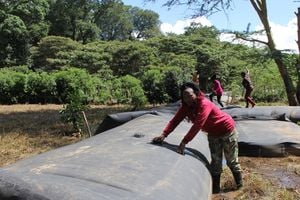Covid-19 pushes Lamu women to green maize business

Women buying maize at the seafront depot in Lamu Town. They have been forced to engage in the business to cushion their families after their husbands lost their jobs to Covid-19.
What you need to know:
- In Lamu, the women have turned to maize business to sustain their families after their husbands were rendered jobless due to the pandemic.
- The women buy the maize from middlemen, boil or roast, then hawk them on the streets of Lamu town.
The Covid-19 pandemic has brought about economic and social crises, taking a toll on families, with cases of gender-based violence and family break ups on the rise. Some women have, however, sought better means to shield their families from the financial catastrophe brought about by the pandemic.
In Lamu, the women have turned to maize business to sustain their families after their husbands were rendered jobless due to the pandemic.
The wake up as early as 4am to beat the scramble for the green maize, brought in by middlemen from Mpeketoni in Lamu West, and other parts of the country.
The maize is offloaded from boats at the Lamu Old Town Seafront jetty. At 4.30am, you will find men and women lining up to get the fresh maize from the middlemen.
Once they buy the maize, they boil or roast them to hawk on the streets of Lamu Island, at a small profit.
Claudia Thoya, one of the businesswomen from Kashmir area within Lamu Town, says it is a difficult encounter as they have to scramble for the maize with men, who always end up getting the best quality and quantity.
“It is a tough job competing with these men but we have no option. My husband is a carpenter but since the Covid-19 pandemic started, the business went down and I had to intervene to sustain our family,” says Ms Thoya.
The middlemen sell a cob of green maize for between Sh20 to Sh25 then the women sell them at between Sh30 to Sh40 after roasting or boiling.
Kazi Mtaani
Aisha Athman another hawker from Mtamuini within Lamu Town, now calls on the government to introduce empowerment programs, including extension of the Kazi Mtaani program to help women in sustaining their families during this Covid-19 period.
She acknowledges that life has become difficult, especially now when children are joining Form One.
“My husband is a casual labourer and his job was affected by Covid-19. I am forced to wake up early every day, to buy maize and resell though I make very little profit. The government should reintroduce Kazi Mtaani, specifically for women,” says Ms Athman.

The women have to wake up as early as 4am to beat the scramble for the green maize, brought in by middlemen from Mpeketoni in Lamu West, and other parts of the country.
Zeinab Kahindi says the middlemen exploit them; selling them the maize at a high price, a situation that leads to her making very little profit.
She wants the county and national governments to support them in undertaking irrigation farming that would enable them produce maize in their villages.
“The maize comes all the way from Mpeketoni while others are ferried from upcountry. That’s why they are sold at hefty prices,” says Ms Kahindi.
Dzendere Moneni notes that despite their efforts to sustain their families through the sale of maize, they lack a common place to sell them. Worse still, the maize business has now flooded in Lamu Town compared to previous years.
Stiff competition
“We are facing stiff competition, especially from men who are more experienced in the business. In fact, most customers prefer buying the maize from men,” observes Ms Moneni.
Fatuma Bwana another businesswoman calls on the county government to speed up the completion of the Sh50 million Lamu Municipal market to enable them get permanent space instead of hawking on streets.
“We want to have specific points where customers will visit to buy the commodities from us,” she says.
A middleman in the maize business Geoffrey Wainoga, terms the women as his reliable customers and ensures they get first priority when the maize reaches the depot.
“These women are my daily customers. Instead of leaving them to scramble for the maize with men, I allow them to book in advance so that they don’t get hurt. They only come to pick their sacks,” offers Mr Wainoga.
Lamu Women Alliance Organisation chairperson Raya Famau praises the women for their dedicated efforts in ensuring their families stand during this pandemic period, noting that many families have broken up after the men lost their jobs.
“I am happy that through such efforts, some families have remained intact to date,” says Ms Famau.





